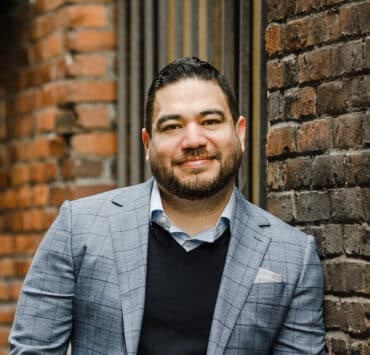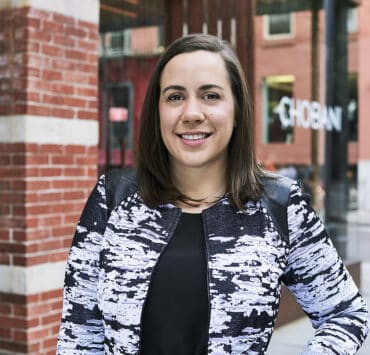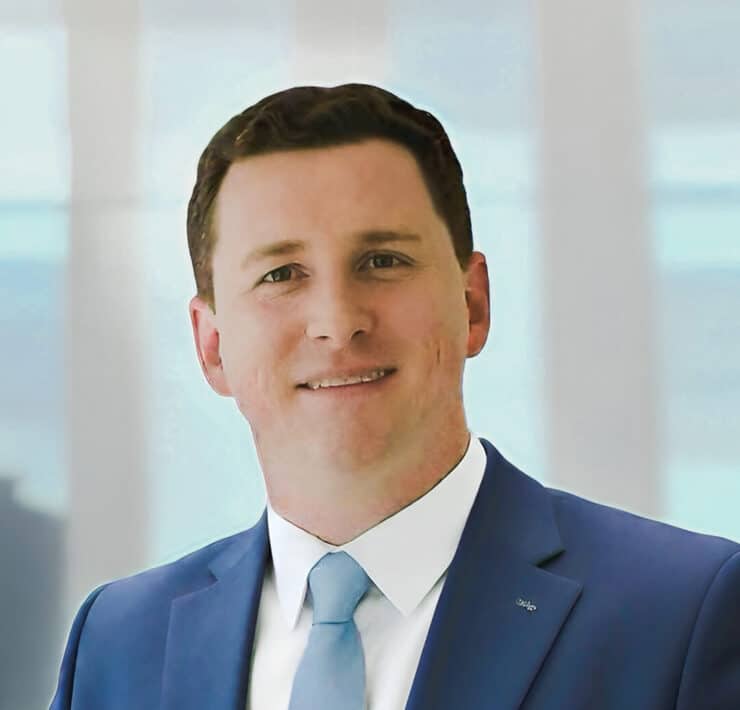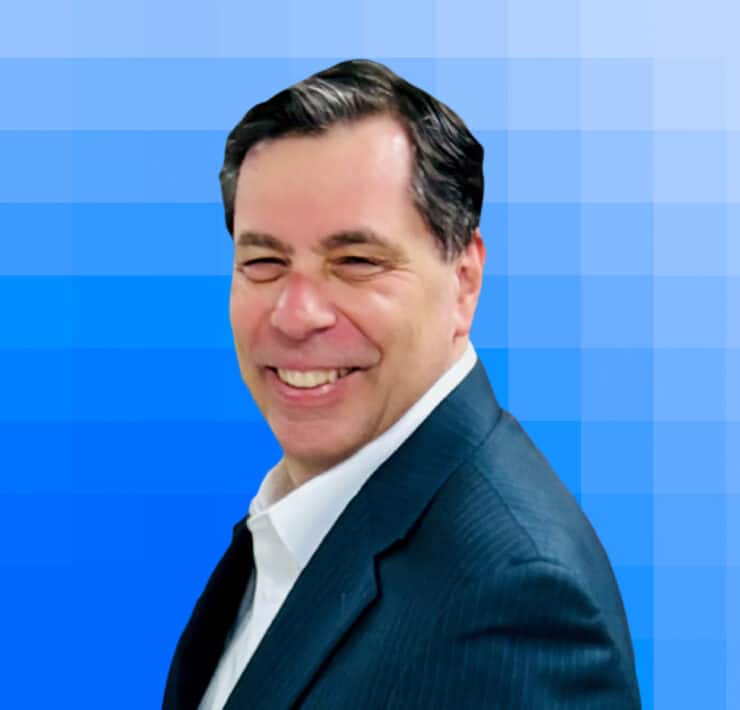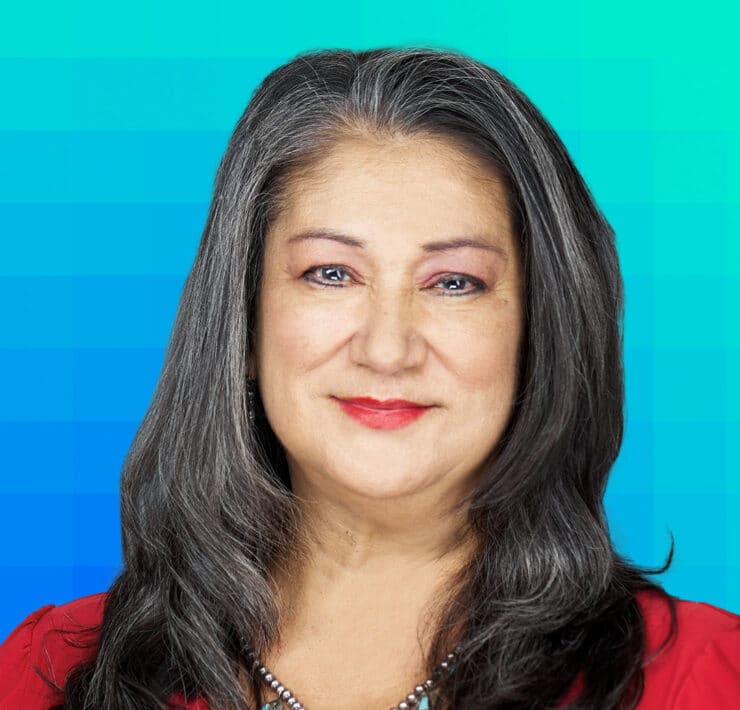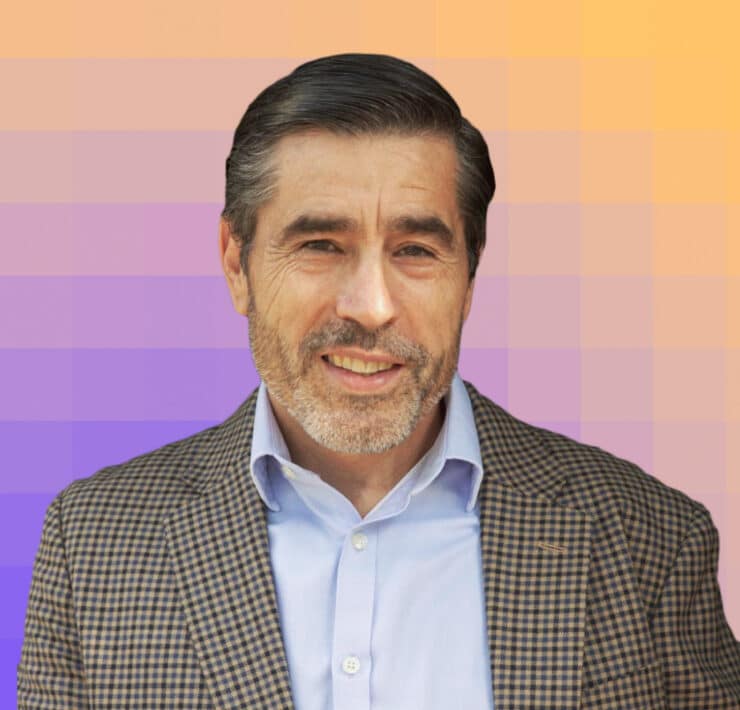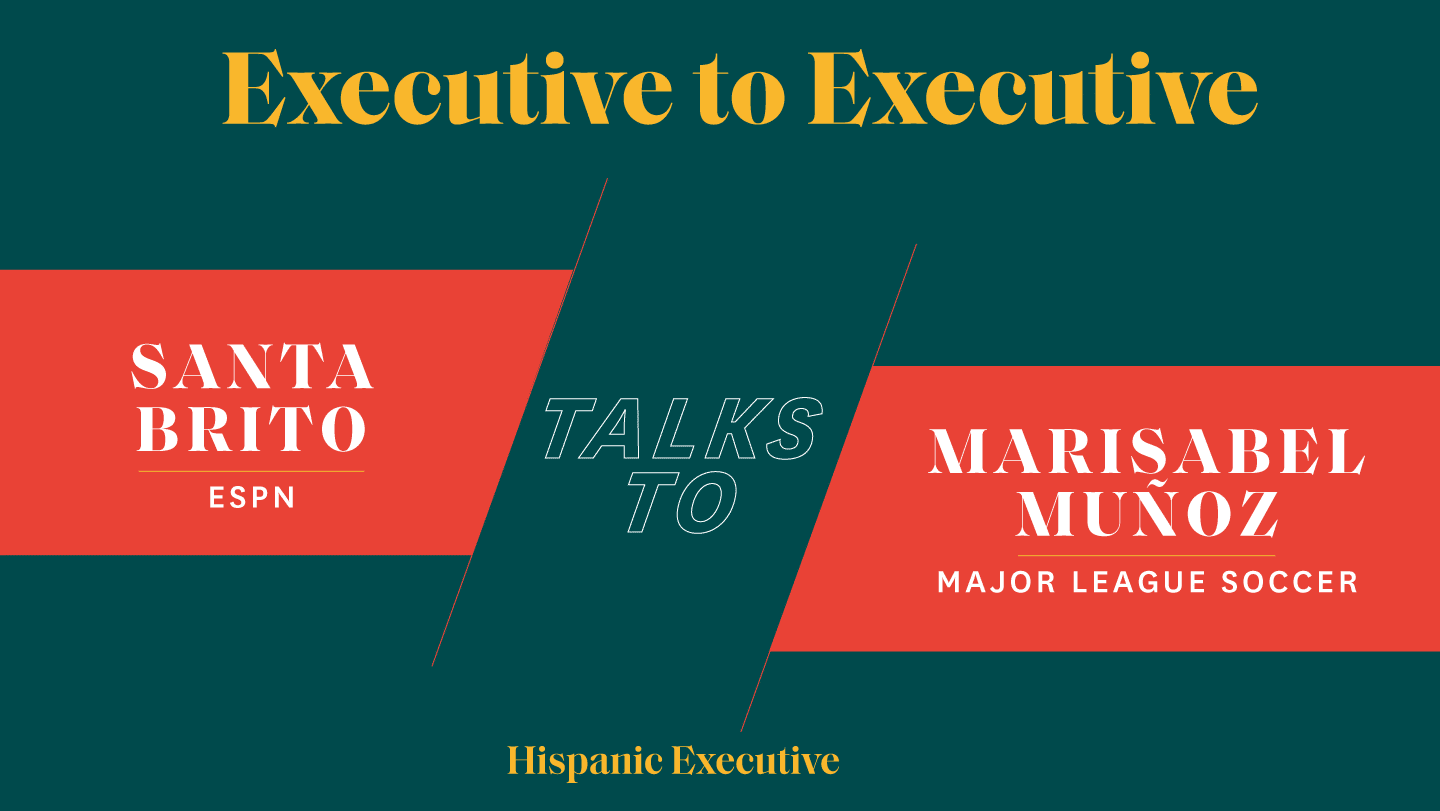
VIDEO CONTENT ENABLED
Hispanic Executive’s mission is to unite the leaders of the new majority by turning a spotlight on business’s most influential Latinos. Simply put, we tell stories about Latinos and for Latinos. But as ESPN’s Director of Communications Santa Brito puts it, “no one can tell our stories better than we can.”
Our Executive-to-Executive interviews put the power of storytelling directly in the hands of Latinos themselves. Through these peer-to-peer conversations, executives like Brito can share key moments from their journeys, inspire future generations, and own the way they share their stories. In turn, our audience gains a line of sight into the executive experience as well as direct insight into what leaders around the world are really thinking and talking about.
Here, Brito speaks with her longtime colleague and friend Marisabel Muñoz, who currently serves as the senior vice president of communications for Major League Soccer, about their families, their perspectives on mentorship, and their shared experiences as Latina executives working at the intersection of sports and communications.
You’ve played an incredible role in promoting soccer in the US and were actually featured by Sports Illustrated in 2017 as one of the most powerful Latinos in sports. But I want to take a step back, because when we connected last week, you mentioned that you grew up in a soccer family. So, let’s start there. What was your childhood like? Can you share with us some of the early experiences that led you to your career path?
Muñoz: My childhood gave me a foundation in soccer, and I would only realize many years later how valuable that would become for me as a professional and as a person. I was lucky to be raised in South Florida in a Spanish-speaking community. My parents were both great soccer fans; they really appreciated the sport. And together with my brother, who was a competitive athlete and would become a pro, we grew up on the soccer pitch. And I was able to experience and lay down a foundation for many different things.
Can you tell me a little more about your experiences as the daughter of immigrant parents? I’m an immigrant myself—I’m originally from the Dominican Republic and moved here with my family, just as many of us moved to the US in search of better opportunities. What kind of inspiration do you draw from your family and your experiences growing up in an immigrant household?
Muñoz: I think that’s one of the biggest contributors to the very unique career that I’ve had, the fact that my parents migrated to South Florida. They were dedicated and committed to their family, to their children, and at the same time, they were overcoming obstacles that every individual or family that has come to this country has faced: they didn’t know the language well, they were starting from scratch, they weren’t able to help their children with their schoolwork because it was in a different language.
But they worked hard to achieve their goals and raise their children and give us a bigger and greater opportunity, which is why they came. I think all that makes you strive because you see your parents striving—and at the same time overcoming obstacles that some of us don’t have to face, given the opportunities that we have.
It’s pretty obvious that your family set a strong foundation for you. Your bio says that you started your career with the Miami Herald, but it feels like it really started much earlier, with you helping your brother as he was pursuing his own career in soccer. Can you share a little more of that experience?
“I recall doing my homework pitch-side on weeknights at [my brother’s] practices and, on the weekend, trying to study for tests at his games. So later on, writing about games came naturally to me.”
Marisabel Muñoz
So you’re celebrating your twentieth anniversary with Major League Soccer. Can you talk a little bit about your career progression? I remember you saying once that you grew up with Major League Soccer—can you share a bit about how you’ve evolved as an executive at MLS?
Muñoz: So you’ve said it: I feel like I’ve grown up with MLS. When I first joined twenty seasons ago, we had ten teams, we had one soccer stadium, and there were concerns about the league’s future. Twenty seasons later, under the great leadership of Commissioner Don Garber and our ownership, things have changed: we will welcome our twenty-ninth team in 2023, we have more than twenty-five soccer stadiums, and this May, we’re going to be debuting the largest soccer stadium in the country in the United States, in Nashville.
As you can imagine, all of that growth—new teams, new players, new owners, new stadiums—expands opportunities exponentially from a strategic PR and communications perspective, which aligns so much with who I am and what I love to do. I am grateful that I was given and continue to be given the opportunity to learn, to experience, and to impact what we do.
What would you say was one of the most pivotal moments in your career, and how did that impact you?
Muñoz: In soccer, we see much of life in four-year cycles, which is the World Cup cycle, and some of the best and some of the worst moments of my life have occurred on World Cup years. It’s hard to forget losing a loved one, or becoming a parent, which for me happened on World Cup years. And while those experiences impacted me personally, they also put your career in perspective. They’ve made me learn and made me a better professional and a better person.
All that said, though, World Cup years also bring more attention to our sport, and MLS experiences tremendous growth in those moments. Ultimately, being able to contribute and going to work knowing that I’m able to help grow the sport, that makes me proud and makes my family proud.
So let’s switch gears for a little bit. Particularly given our audience, one of the things that we really want to focus on is mentorship. I can tell you, going back to when I was in high school, I had a teacher who really believed in me, who I would dare say saw things in me that I probably didn’t even see in myself at that age. And I think her support really helped me stay focused and propelled me forward. How critical has mentorship been in your own career?
“Those individuals in your personal and your work life who are there for you or with you day after day, they become mentors without you even realizing it. And those are the ones I’m most grateful for because it’s organic.”
Marisabel Muñoz
And what advice would you give someone who’s looking for a mentor? What do you think makes a good mentorship relationship work?
Muñoz: I think a mentor has to be someone that you respect, and ideally someone that you work with often helps because you see them more consistently. But there are many mentors who you won’t necessarily work with on a regular basis. Ultimately, it boils down to respect and to experience: mentors have to be people who you would potentially see yourself as in the future.
I also think a mentorship relationship has to work both ways. There has to be some sort of mutual benefit: you have to think about who you align with, who you respect, and who your beliefs align with, but you also have to think about what you can provide, what you can bring to that person and to that relationship.
Muñoz: Absolutely. And that applies to so many different things in your life—mentorship, sponsorship, who you report to, who reports to you, who you work alongside. It all boils down to mutual respect. And because soccer is a global sport, we’re able to meet individuals from many different backgrounds and different countries. When the mutual respect is there, you can learn from so many different people and so many different perspectives. It’s very enriching.
During some of our previous conversations, you mentioned that you have been very lucky—that you always felt supported at Major League Soccer as a female executive. What is MLS doing that you think other companies can learn from when it comes to attracting more women and more diverse talent into our industry?
Muñoz: I’m very proud that I’ve been supported by many different individuals at MLS—men, women, and minority leaders at the League office, at our clubs, among our ownership. What others may call minority traits, I see as strengths. So being female, being Hispanic, and standing out—I’ve always seen that as a good thing, as something that’s working in my favor. And if you add in working hard, working on your skill set every day, and being passionate about the topic at hand—which in our case is soccer, our clubs, our players, how we’re growing, and how we fit within the larger global soccer ecosystem—the professional growth will come. And I think the leadership here at MLS has recognized that.
How do you think we can continue to empower each other as Latinas and open the path for the next generation of Latino professionals?
Muñoz: I always say to embrace being different. Find what you’re passionate about and go all in—then find other people who are like you, who share those values, because together you’re stronger.
We are a global sport: soccer runs in the blood of many of us, especially us Hispanics, who grow up loving the sport. At MLS, it doesn’t matter who are you are. If you’re talented, there’s opportunity. And if you work hard, as my parents taught me, your reward will come. It will. You just have to be smart, surround yourself with good people, and work at showcasing and showing off the work that you do.
Also, support talent and pay it forward. And at the end of the day, just lead by example. Ultimately, that’s the strongest form of mentorship you can provide to anyone.
I have one last question for you, Marisabel. Our industry—the communications industry—is truly not the most diverse. There’s a lot of work to be done, and over the last two years, we’ve been having a lot of those conversations about what our industry can be doing more of to attract more Black and brown voices—more people like us—into this field. I can tell you, when I started my career in communications, there were not a lot of Black and Latina faces in the room. So I’d love to get your perspective on how the industry can continue to bring on board more diverse voices.
“We are catering and servicing journalists and fans in language but also in culture, and that is a reflection of our fanbase. Our staff here very much reflects that.”
Marisabel Muñoz
This interview was edited for length and clarity.
